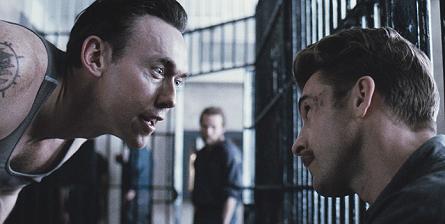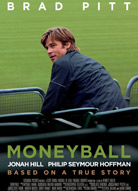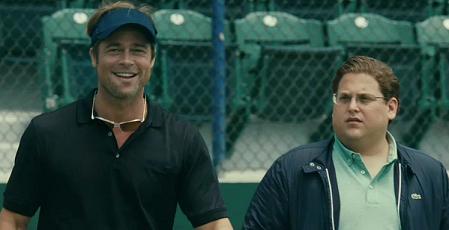TIFF: Biopic Boys will be Boys
 Friday, September 9, 2011 at 8:00AM
Friday, September 9, 2011 at 8:00AM Paolo here in Toronto. My first TIFF movies are about real-life men who customarily look nothing like the attractive actors who play them on the big screen.

Edwin Boyd is a step in the right direction for Canadian cinema, since making a heist film like this is both relatively cheap and lucrative. It's about the WWII veteran turned 1950's Torontonian bank robber of the same name played by Scott Speedman. Speedman puts an athletic sensitivity to the role, whether Edwin is inside a singing booth or jumping over the counter to get the loot he wouldn't have gotten in his former job as a kind-hearted bus driver. The story covers him facing and indulging temptations, his addiction to the wrong kind of attention as well as to robbing banks, which he and his gang continue to do despite multiple arrests. There are clichés here, the biggest one is the golden-hearted criminal who also likes to get drunk and play music while celebrating his jackpots. I will give credit to the film's capability on whetting the audience's appetite on period specificities. It's also a treat to watch its grey and white cinematography, capturing the rough surfaces of the city's architecture or his snowy escape from authorities. The supporting cast includes Kevin Durand as Edwin's right hand man and Brian Cox as the protagonist's father.
 Also took in the Brad Pitt vehicle Moneyball which is about the baseball team Oakland Athletics in their 2002 season.
Also took in the Brad Pitt vehicle Moneyball which is about the baseball team Oakland Athletics in their 2002 season.
The film's first half is has a problematically distinct voice from its second, making it difficult to forget that two writers are responsible for its script. The first, which I'll call the Steve Zaillian half, has Pitt portraying the A's general manager Billy Beane. The script makes him have the same conversation with other people, telling his financier, other GM's, his precocious daughter, her mother (Robin Wright) and her mother's boyfriend (Spike Jonze) that he's fine even if both parties know, through local and national news, that his team is having board room and locker room problems. The A's are having trouble finding 'stars' like Jason Giambi who have left the team. Fortunately, Billy meets Peter Brand (Jonah Hill), a fictionalized version of Paul de Podesta who introduces the idea that instead of buying 'stars,' the team has to 'buy runs.' It's a method that, to someone like me who knows nothing about sports, sounds like cheating.
The underlying tension in many scenes in the film's first half is in anticipating Billy to squirm or get angry under all of these people's microscopes. This half also allows its audience to think about what might have happened if the person originally slated to direct this movie, Steven Soderbergh, had done so. Hopefully I'm not the only person who can see Soderbergh's skills in satire, and he would have highlighted these characters' callousness and childlike stubbornness.

The second half, when the A's fate turns around, belongs to a writer with a more distinct voice, brainy frat boy Aaron Sorkin. Just like Charlie Wilson's War or Studio 60, this movie has its share of Abbott and Costello-like telephone or office conversations. He also tends to romanticize whatever he's writing about, which is baseball this time around. He even makes Peter, a generally scientifically minded character in the first half, seem emotional later on. But admittedly it still works better here than the affected humanity in The Social Network. Director Bennett Miller, with the help of his male dominated cast (including the surprisingly capable Hill) also negotiates and sutures these two voices well.
 Aaron Sorkin,
Aaron Sorkin,  Bennett Miller,
Bennett Miller,  Brad Pitt,
Brad Pitt,  Canada,
Canada,  Jonah Hill,
Jonah Hill,  Scott Speedman,
Scott Speedman,  Screenplays,
Screenplays,  TIFF,
TIFF,  biopics,
biopics,  sports
sports 

